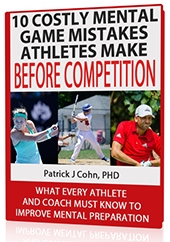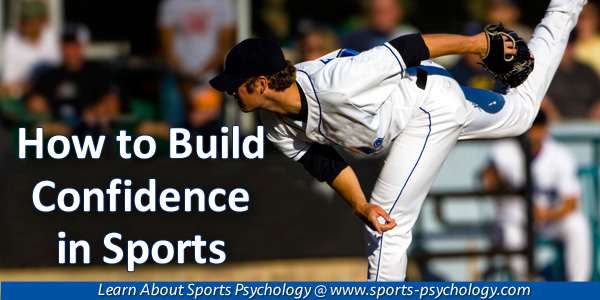Don’t Leave Confidence to Chance in Sports
Summary: The most valuable tool an athlete can bring to competition isn’t equipment—it’s confidence. Just like you wouldn’t play golf with a bent driver or baseball without a glove, competing without confidence puts you at a major disadvantage. Confidence doesn’t appear by chance; it requires preparation, practice, and proactive effort.
What is the most important tool for athletes?
Imagine a golfer about to tee off to start a round with a bent driver in hand… Or a tennis player on the court without tennis shoes… Or a baseball player starting their game without a glove…
Starting a competition with damaged equipment or no equipment at all sounds ridiculous. In fact, you would never knowingly leave your house without having the proper equipment to play at your peak…
You probably go to great lengths to ensure your equipment is in tip-top shape. You may even spend more money to buy better equipment to give you an edge against the competition.
Interestingly enough, the most important tool you can take to a competition is confidence.
Playing without confidence is no different than leaving your putter, shoes or glove at home.
Confidence is a necessary tool if you are to play at your peak.
How Much Time do you Spend Cultivating the Mental Skill of Confidence?
If you get your confidence in tip-top shape, you will have a huge edge over your competitors.
You might be thinking, “I am not sure how to build confidence…”
Well, you didn’t know how to properly swing a golf club at first until you sought out the expert advice from another golfer or coach.
You probably didn’t know the best fit for tennis shoes until you asked someone for help. You might even have done research online to find a baseball glove to best meet your needs.
If you want to compete with more confidence, then you need to be proactive and find resources to help with confidence building.
You can research effective confidence-building strategies, ask other athletes how they tend to their confidence or work with a mental game coach.
Regardless, if you want more confidence, you need to WORK to improve your confidence level.
Chicago White Sox starting pitcher, Lucas Giolito, was having difficulty at the major league level until he decided to do something to improve his play…
Giolito had confidence issues and difficulty trusting his arsenal of pitches. Instead of taking the mound focused on his just pitching, Giolito took the mound overwhelmed with doubt.
GIOLITO: “Last year, the confidence wasn’t there. I was doing way too much thinking about all sorts of different things. Am I going to figure it out? Am I going to improve? What’s going to happen to me here?”
So Giolito worked on his confidence game and pointed to confidence as the difference-maker in his development as a professional pitcher this year.
GIOLITO: “Eventually, I learned to let go of that stuff [doubt]. Our pitching coach, Steve McCatty, kept telling me I had really good stuff and that I had to trust it. He said, ‘When it’s time to go and compete, it’s time to go and compete.'”
Confidence doesn’t grow by chance. So how will you go about building your confidence?
How to Build Confidence:
Two components of confidence are preparation and being proactive.
Write down practice goals for each practice, training session or practice with a private or mental coach. Practice goals will increase your level of preparation.
Next, prior to a competition, remind yourself of what you have done to prepare for the competition. This will help build trust in your training.
Also, focus on your talents and strengths instead of what you think you don’t have.
Get all my confidence-building strategies in The Confident Athlete
Related Sports Psychology Articles:
- Boosting Confidence in Young Athletes
- Maintaining Confidence After a Bad Performance
- Improving Your Confidence to Play at Your Peak
Free Mental Toughness Reports

Get instant access to a mental game report to improve your mental toughness. Are you making one or more of these “deadly” mental game mistakes prior to competition? You can improve your mental game with one of our free sports-specific reports below.
with our free mental toughness reports, you’ll:
- Discover if you have positive or negative pregame jitters.
- Identify your pre-competition mental game mistakes.
- Learn the important pregame mental skills to boost your performance and success!
Learn how mental game strategies can boost your mental toughness in sports with Dr. Cohn’s free mental game reports!
FAQ: Improving Your Confidence to Play at Your Peak
Q: Why is confidence considered the most important tool for athletes?
A: Confidence allows athletes to trust their abilities and perform at their peak, while doubt leads to hesitation and mistakes.
Q: Can confidence really be trained like physical skills?
A: Yes. Confidence grows through preparation, setting goals, mental training, and focusing on strengths rather than weaknesses.
Q: What happens when athletes compete without confidence?
A: They often overthink, play tentatively, and struggle to trust their training, which limits performance.
Q: How did Lucas Giolito improve his game?
A: By letting go of doubt, trusting his pitching abilities, and building his confidence with the help of his coach.
Q: What practical steps can athletes take to build confidence?
A: Write down specific practice goals, review preparation before competitions, and focus on personal strengths instead of shortcomings.
Q: Who can athletes turn to for help with confidence-building?
A: Athletes can seek advice from teammates, coaches, or work directly with a mental game coach to strengthen their confidence.
Dr. Patrick Cohn is an expert mental performance coach who has helped athletes for over 30 years enhance their performance. Dr. Cohn earned a master’s degree in sports psychology from CSUF and a Ph.D. from the University of Virginia, specializing in Applied Sports Psychology.

